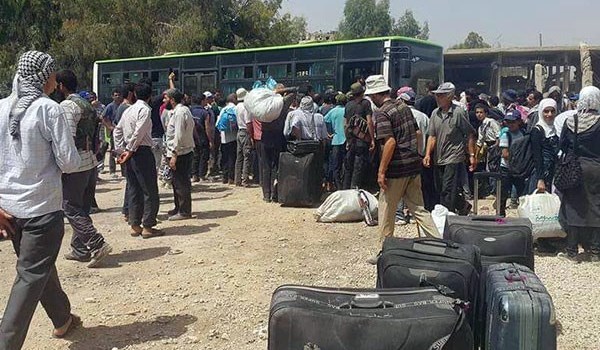
RNA - Under the deal, some 4,000 civilians are leaving Darayya, as well as 700 bedraggled and hungry militants. According to local media reports, the defeated militants are going to the northern rebel stronghold of Idlib, taking only light weapons with them, while civilians are being taken to reception centres in safer areas near Damascus. Darayya’s local council says civilians are being taken to the government-held town of Hrajela in western Ghouta, outside the capital. From there they can return home or will continue to the areas they wish to go to.
As is, the fall of Darayya is the beginning of the end for the foreign-backed rebellion, masquerading as a “democracy” and “revolution” that has clung on in the Damascus suburbs for five years. Once the “symbolic heart” of the 2011 armed rebellion against the government, the fall of Darayya is a turning point as well, perhaps even more important than the running developments in Aleppo, in the battle for southern Syria. What's more, this enables the Army to send nearly 2,500 soldiers from the 4th Mechanized Division to other fronts.
Of course, this is not what the United States, the main sponsor of jihadists and sectarian elements, and/or the United Nations had exactly in mind when the bogus "revolution" started. In a sharply worded statement, the UN’s Syria Envoy Staffan de Mistura said he became aware of the Darayya agreement “overnight” and that the United Nations “was not consulted or involved in the negotiation.”
In response, it suffices to state that this is an accountable government that reflects the opinion of the majority of the population. The people of Darayya are protected in any deal or evacuation that takes place and this takes place voluntarily – without the need for foreign intervention or meddling. Besides, the social base of the government is still strong - despite Western claims to the contrary.
Meaning, the government is more than happy to see the end of this unnecessary bloodshed and more than willing to welcome the besieged civilians to the greater civil society. After all, these people are Syrians, not foreign jihadists and certainly not Takfiri zealots. Under the constitution, there will always be state guarantees for their protection and general well-being.
Taken together, therefore, the fall of Darayya will have a domino effect, piling pressure on the last remaining pockets of imperialist forces around the capital and elsewhere throughout the country. A similar fate awaits other abandoned and frustrated rebels as well, who have made alliances with imperialism and terror groups, and who are still doing the bidding for the United States and its regional proxies.
Likewise, the fall of Darayya is a symbol of retreat for the United States and its regional proxies from their support for regime change in the face of international criticism and blowback. In any case, it’s no great revelation that imperialism will never be able to shape the outcome of this illegal war. So no matter how many guns and how much money they run to their proxy forces, the regime changers will never be able to install a post-Assad leadership to their liking.
To be sure, the fall of Darayya is a terminal crisis for the imperialist forces and the bogus revolutionaries. It will shape the outcome of the war, helping the government forces snuff out the lamp of the wicked and the remaining pliable tools of imperialism in Syria. Here, there will be no repeat of Libya.
111/847/C